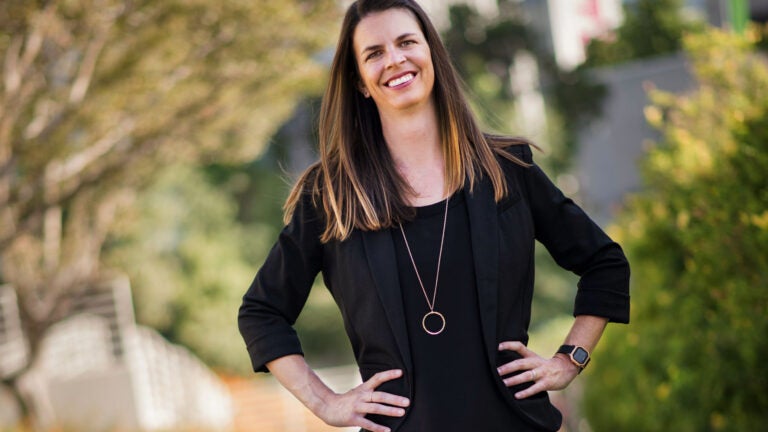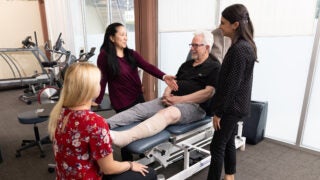
Andrea Du Bois had an acoustic neuroma, a rare and benign tumor that slowly develops on the eighth cranial nerve leading from the inner ear to the brain. (Photo/Hannah Benet)
Trojan finds her balance despite rare type of hearing loss
Doctoral candidate copes with vertigo thanks to USC physical therapy faculty members
As a kinesiology graduate student in 2010, Andrea Du Bois had a startling realization while playing the game of telephone.
“The person sitting next to me whispered in my ear, and I couldn’t make out the words,” said Du Bois, a PhD candidate in biokinesiology at USC. “I knew I blew the game.”
A hearing test and MRI performed at Keck Medicine of USC would later explain the hearing loss in her left ear: Du Bois had an acoustic neuroma, a rare and benign tumor that slowly develops on the eighth cranial nerve leading from the inner ear to the brain.
Every year, one out of every 100,000 Americans will develop an acoustic neuroma, according to the National Institutes of Health.
Aside from hearing loss, acoustic neuromas — and their surgical removal — can cause vestibular nerve damage that can result in vertigo and balance impairments.
Acoustic neuroma and the healing process
Receiving the diagnosis was an emotional experience for Du Bois, who enjoys hiking and other outdoor activities with her husband.
But she steeled herself by thinking of her best friend who died of a rare form of cancer before reaching the age of 30.
“I knew there would be a healing process,” she said. “But after watching my friend fight cancer for two years, I knew I could get through this.”
After acoustic neuroma surgery: The room was spinning
In 2016, six days before her 31st birthday, Du Bois underwent acoustic neuroma surgery. To access the tumor, Rick Friedman and Steven Giannotta — from the USC Acoustic Neuroma Center — removed a section of her skull from behind her ear. After inserting abdominal fat into the hole in her skull, the surgeons sealed it with a titanium plate.
I came to USC as a student, never expecting to be a patient.
Andrea Du Bois
“I came to USC as a student, never expecting to be a patient,” Du Bois said. “I had no idea at the time that I would be treated by the best facility in the world for my acoustic neuroma.”
However, nothing could have prepared her for the moment when she woke up from surgery.
“I opened my eyes, and the whole room was spinning,” said Du Bois, who experienced vertigo by simply turning her head, blinking or speaking.
But with the help of Libby (Acreman) Krause, a Keck Medicine of USC inpatient physical therapist, Du Bois was able to walk during her first physical therapy session.
“She was very motivated to participate in exercises because she understood the concepts of neuroplasticity and adaptation in greater depth than most patients,” Krause said.
Four days after surgery, Du Bois was allowed to go home.
She then began outpatient physical therapy with Lori Ginoza at the USC Physical Therapy-Health Sciences Campus, a practice staffed by USC Division of Biokinesiology and Physical Therapy faculty members.
Eager to be active again
Determined to return to her active lifestyle, Du Bois continued to take her physical therapy sessions very seriously.
“Simple things like standing with my feet together with my eyes closed were so hard,” she said. “I would just tip over like a tree that had been cut down.”
Ginoza’s outpatient physical therapy plan for Du Bois included vestibular exercises to improve coordination of eye and head movements and balance retraining.
“Many patients become their own advocate, and [Du Bois] was really good about paying attention to her body and understanding it in a way that she could push herself, but not overdo it,” said Ginoza, an instructor of clinical physical therapy at the division.
While Du Bois knew the important role physical therapy would play in her ongoing recovery, she had not expected the emotional impact it would have on her life.
“Both Libby and Lori were incredibly supportive and encouraging during the sessions,” Du Bois said. “They gave me the confidence to push my body and let me know that even though some of the exercises could make me feel sick, that is how I would get stronger.”
Thankful to be a Trojan
It’s been two years since Du Bois had her acoustic neuroma removed, and her balance continues to improve.
“I was able to get on skis this last season, and that was a great experience,” said Du Bois, who often wears a hearing aid to counteract the deafness caused by surgery in her left ear.
Still, she finds that walking on uneven terrain, driving long distances or being in certain lighting conditions can give her “wonky head.”
“It is a spacey feeling where you almost feel like your head is not part of your body,” Du Bois said. “Part of my life will just be learning my triggers and learning how to cope.”
For Du Bois, the gratitude she feels for USC is twofold.
“I have not only received an outstanding education, but outstanding care as a patient,” she said. “I believe I ended up at USC for a reason, beyond my professional development. I am so thankful that I am a Trojan.”



